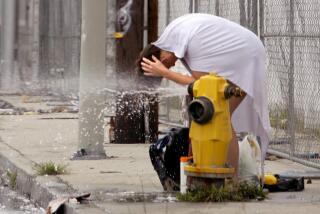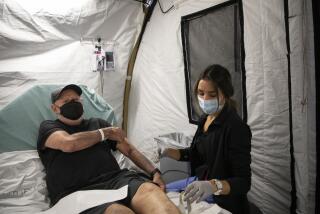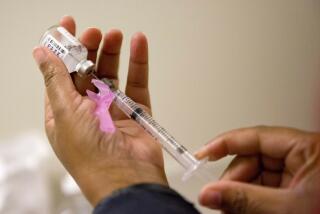County declares health emergency for hepatitis outbreak
San Diego County declared a local health emergency early Friday night, adding a new level of urgency to a hepatitis A outbreak that has hit the homeless population hardest, killing 15 people and hospitalizing hundreds.
Dr. Wilma Wooten, the region’s public health officer, signed the declaration shortly after lawyers finished writing it, bolstering the county Health and Human Services Agency’s ability to request assistance from the state and providing legal protections for a slate of actions that began unfolding across the city earlier in the day.
Working on a county contract, a private company began delivering portable hand-washing stations Friday morning in locations where homeless residents tend to congregate. Twenty stations were in place by the end of the day and 20 more, a county spokesman said, were scheduled for installation Saturday.
That effort is to be followed by street-cleaning crews shooting high-pressure water spiked with bleach to remove “all feces, blood, bodily fluids or contaminated surfaces,” according to a sanitation plan included in a letter delivered to city government Thursday.
The cleansing plans, Wooten said, are modeled on similar efforts used to control hepatitis A infections in Los Angeles.
“We know that L.A. has had no local cases of hepatitis A related to the strain that we’re seeing here in San Diego,” she said. “It makes sense that, if they’re doing it there and they haven’t had any cases, it could be beneficial here as well.”
It has been clear for some time that the local outbreak is far beyond ordinary. With 378 cases confirmed to date, it’s the largest surge seen in at least 20 years.
The first cases linked to the outbreak occurred in November 2016, but there weren’t enough of them until about March for local epidemiologists to know for sure that infections were spreading more quickly than usual. Most hepatitis A outbreaks are associated with specific foods picked or processed under unsanitary conditions. The virus that causes the condition lives in human feces and is spread when people don’t wash their hands thoroughly enough after using the bathroom.
From the outset, the public health response to the outbreak has been vaccination and education. Though thousands of doses of vaccine have been distributed to date, that effort has not appreciably slowed infection rates while the number of deaths reported in recent weeks has accelerated.
Because infections are most common among the homeless who often have no access to sanitary facilities, the county’s efforts began to turn toward hand washing and street cleaning in early summer.
But that transition has been painfully slow.
An article earlier this week published by Voice of San Diego pointed out bureaucratic hurdles which have delayed sanitation improvements even as public health nurses pursued a countywide vaccination campaign which targeted the homeless at shelters, while mobile teams explored the more remote locations where those without homes tend to go.
Thursday’s letter was the first time the health department gave pointed and unequivocal direction to the city, stating that the municipality should take “immediate action” to “address the unsanitary living conditions of the at-risk population.”
The city responded early Friday morning with a press release that indicated it would work with the county to follow its guidelines, however, it may take 10 days to comply with the street-washing request due to a lawsuit that requires 72-hours notice before the spraying begins.
The sudden action begs a simple question: Why didn’t all of this start back in late June or early July when the county first talked about hand-washing stations?
San Diego City Councilman David Alvarez fired off a memo to Mayor Kevin Faulconer Thursday demanding a crisis declaration, expressing his dissatisfaction that the outbreak has continued to claim lives while the city continues to wait for resolution to provide temporary housing which would presumably bring with it better access to the bathrooms and showers necessary to alleviate the current mess on city streets.
“I just assumed the county was doing everything that they could do and that the city was facilitating what the county needed, but that has not been the case,” Alvarez said. “It just infuriated me that the bureaucracy was getting in the way of doing the right thing.”
Criticism has also come from state Sen. Ben Hueso and the Service Employees Union International which have both said they do not believe the county employs enough public health nurses to meet the demands of the hepatitis A investigation while also handling large children’s health and foster care programs. On Wednesday the state legislature’s Joint Committee On Legislative Audit approved Hueso’s request to determine whether or not the amount of health resources available are adequate. Committee members approved the audit request 10-3, and it is expected to take between four and five months to complete.
There was a lot of finger pointing between City Hall and the County Administration Center Thursday and Friday. Both sides insisted they were doing what they could in a situation that is unique.
“There is no precedent for this,” Wooten said. “We will definitely have a playbook for if we have something like this in the future, but this is the first time we have had something of this nature happen.”
She added that, in the coming days and weeks, the hand-washing and street-sanitizing efforts underway in San Diego will spread to other cities.
“We were talking to El Cajon already, and we will be talking to Escondido, Oceanside, National City and Chula Vista soon,” Wooten said.
Correction
An earlier version of this story incorrectly reported one additional victim and the month the outbreak was determined. The story has been updated.
paul.sisson@sduniontribune.com
(619) 293-1850
Twitter: @paulsisson
More to Read
Sign up for Essential California
The most important California stories and recommendations in your inbox every morning.
You may occasionally receive promotional content from the Los Angeles Times.










